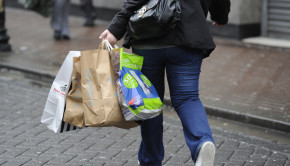Irish consumer sentiment remains subdued – KBC

Subdued readings partly a cause of Brexit, but largely because economic recovery has underdelivered
3 March 2020
The KBC Bank Irish consumer sentiment index ticked down to 85.2 in February from 85.5 in January, a marginal decline that does not suggest any statistically significant change in the mood of Irish consumers.
According to KBC, the largely unchanged reading reflects a balance between important but opposing influences that emphasises the confusing nature of Irish economic circumstances at present. Irish consumer confidence effectively held steady as reduced nervousness about the outlook for the Irish economy broadly offset ongoing concerns about household finances.
The stable Irish confidence outturn for February contrasted with more upbeat readings elsewhere. A marginal improvement in the preliminary consumer sentiment reading for the US and a marked improvement in the corresponding figure for the EU meant that both of these surveys are now well above their long term averages whereas the Irish index is now slightly below its long term average of 87.9.
On this basis, KBC suggested that consumers in the US and across the EU now see their glass as more than half full. Despite some recent improvement, Irish consumers remain concerned about problems, whether these relate to their current reality or looming risks. This translates into an Irish consumer sentiment reading that sees the glass as half empty.
While Brexit concerns may explain a significant element of the subdued tone of Irish consumer sentiment readings in recent years, KBC stated that such worries don’t fully explain the pronounced lack of any ‘feelgood factor’ among Irish consumers, an absence that might appear at odds with the sustained strength seen in key Irish economic indicators such as last week’s buoyant jobs data for the final quarter of 2019.
Consumer confidence has been trending lower for the past year and a half while positive momentum in the jobs market has remained impressively strong. KBC stated that an element of ‘growth envy’ is weighing on consumer sentiment as glowing commentary on Irish economic conditions has not been seen to deliver correspondingly marked improvements to the average Irish consumer.
KBC noted that progress at the level of the individual household from the conditions experienced through the austerity years has fallen short of improvement heralded in much economic commentary.
Through the recovery period, the annual increase in income per household has averaged just 2.4% in nominal terms compared to an average 10.8% increase in nominal GDP over the same period. The limited pace of recovery in average incomes and the marked shortfall relative to GDP likely informs a view that the Irish economic recovery has significantly under-delivered for many Irish consumers. The survey found that the more muted gains in the circumstances of the average Irish household broadly corresponds to the trend in consumer sentiment.
In circumstances where Irish inflation has averaged less than 0.5% through the recovery period, KBC suggested that Irish consumers could be underestimating the improvement in their ‘real’ spending power. Still, it adds that consumers’ assessments of purchasing power puts substantial weight on access to housing (or difficulties in this regard that imply an importance beyond their weight in the household budget survey). In this context, the substantial and exceptional weakening in home buying and rent affordability informs a broadly based view of sustained pressure on living standards for significant numbers of Irish consumers.
The details of the February consumer sentiment survey appear broadly consistent with such a judgement. Roughly one in five respondents said their financial circumstances improved in the past twelve months and (in responses to a separate question) a similar number envisage an improvement in the next twelve months. Broadly similar numbers report a recent or expected weakening in their personal finances. So, approximately 80% of Irish consumers don’t see buoyant Irish economic growth currently boosting their financial circumstances. This broadly based sense of remoteness from reports of a booming economy is fostering a troubling undercurrent of ‘feel-bad’ in the mood of Irish consumers at present.
The KBC Consumer Sentiment Survey is a monthly survey of a nationally representative sample of 1,000 adults. Since May 2019, Core Research has undertaken the survey administration and data collection for the KBC Bank Ireland Consumer Sentiment Survey.



 Print
Print



Fans 0
Followers